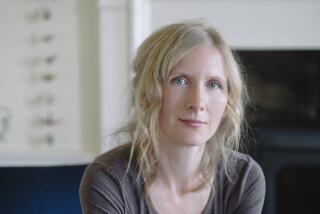‘Orbital,’ which looks down on Earth in awe, wins the 2024 Booker Prize

- Harvey’s book chronicles a day in the life of six astronauts on the International Space Station.
A slim science fiction novel that looks at our “precious and precarious” world through the eyes of six astronauts on the International Space Station has won the 2024 Booker Prize. Samantha Harvey, author of “Orbital,” took home the award Tuesday.
The book focuses on a single day in the life of the astronauts on the ISS, where they discuss fears, dreams and the fragility of human life.
“Compact yet beautifully expansive, Orbital invites us to observe the Earth’s splendour, whilst reflecting on the individual and collective value of every human life,” the Booker Prize judges wrote. “All year we have celebrated fiction that inhabits ideas rather than declaiming on issues, not finding answers but changing the question of what we wanted to explore. Our unanimity about Orbital recognises its beauty and ambition. It reflects Harvey’s extraordinary intensity of attention to the precious and precarious world we share.”
“Orbital” is enjoying some popular as well as critical success. The prize website notes it has sold more copies than the last three Booker Prize winners combined before their wins.
Lili Anolik turns a cache of letters between Joan Didion and Eve Babitz into a book about the unlikely friendship between two seminal L.A. writers before they went their separate ways.
Harvey, who was one of five women among the six authors on the Booker Prize short list, is the first woman to win the award since 2019. And her book, at 136 pages, is the second-shortest ever to win the prize. In an interview on the prize website, she described “Orbital” as a space pastoral and said she wanted to write a realistic, rather than fantastic, version of humans in low Earth orbit.
“Could I evoke the beauty of that vantage point with the care of the nature writer?” she said. “Could I write about amazement?”
Watching footage of Earth orbits from the ISS helped inspire the book, Harvey told NPR, including the 16 sunsets and sunrises the astronauts in her book experience over the day she writes about.
Harvey almost didn’t finish the book at all, she told the BBC. After writing a few thousands words, she said, she lost her nerve. She said she felt like she was trespassing in space and upon the experience of the select few astronauts who had written about it firsthand. “Who am I to do this?” she asked. But, eventually, she picked up the idea again, to prize-winning results.
The prize, worth about $53,000, and trophy were presented to Harvey at a ceremony in London by Paul Lynch, the 2023 winner with “Prophet Song.” An emotional Harvey covered her face with both hands after her book was announced as the winner.
In advance of the 2023 L.A. Times Festival of Books, we surveyed 95 writers and culled 110 works into the Ultimate L.A. Bookshelf. Get ready for some surprises
“We were told that we weren’t allowed to swear in our speech,” she said from the stage, “so there goes my speech. It was just one swear word 150 times.” Harvey went on to thank her family, publisher and agents.
“To look at the Earth from space is a bit like a child looking into a mirror and realizing for the first time that the person in the mirror is herself,” she said in her speech. “What we do to the Earth we do to ourselves, and what we do to life on Earth, human or otherwise, we do to ourselves.” She dedicated the award to those who work in support of the Earth and peace.
“Orbital” bested five other short-listed titles: “Held” by Anne Michaels, “Creation Lake” by Rachel Kushner, “James” by Percival Everett, “The Safekeep” by Yael van der Wouden and “Stone Yard Devotional” by Charlotte Wood.
More to Read
Sign up for our Book Club newsletter
Get the latest news, events and more from the Los Angeles Times Book Club, and help us get L.A. reading and talking.
You may occasionally receive promotional content from the Los Angeles Times.











